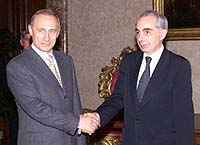Russian missile defense idea a "significant change in attitude," Cohen
by Jim Mannion
Brussels (AFP) June 7, 2000 - Russia's offer to develop a joint missile defense system with NATO marks "a significant change in attitude" by recognizing the threat posed by ballistic missiles, US Defense Secretary William Cohen said Wednesday.
But Cohen warned that Russian President Vladimir Putin's proposal could simply be a bid to drive a wedge between alliance members as Washington nears a decision on whether to deploy a US missile defense system.
"This could be a constructive proposal but it could be simply a tactic to divide the Europeans in NATO from the United States," Cohen told reporters as he flew here for a two-day meeting of NATO defense ministers.
Cohen discussed the Russian missile shield initiative with British Defense Minister Geoffrey Hoon and German Defense Minister Rudolph Scharping in bilateral meetings here ahead of the NATO meeting, a US defense official said.
Putin put forth the idea of a joint Russian-NATO missile defense shield in Rome Monday after a weekend summit in Moscow with President Bill Clinton.
The Russian president offered few details but said his proposal would guarantee Europe's security without altering the nuclear balance.
It is reported to involve the use of theater missile defenses by Russia and NATO to shield Europe by targeting intercontinental ballistic missiles in their boost phase shortly after launch.
That contrasts with US plans for a national missile defense system designed to protect US territory against a limited attack by intercepting incoming ICBMs in space.
"A plan doesn't protect you, a system protects you," a US defense official traveling with Cohen said.
"We are trying very hard to develop a system that we believe will work. A post boost phase system of the type the Russians apparently have described poses more daunting technological problems. There isn't such a system right now," he said
Cohen, observing that there was "a lot of vagueness" in the Russian proposal, said he plans to take it up with Russian Defense Minister Igor Sergeyev here in Brussels and next week in Moscow.
"We'll have to look at what he's proposing in great detail even before making any realistic assessment of what he has in mind," Cohen said.
"I think there has been an attempt over the last year to divide the Europeans from NATO itself," he said.
Clinton is supposed to decide later this year whether to order deployment of the US system, but it would require changes to the 1972 Anti-Ballistic Missile Treaty, which Moscow has so far adamantly refused.
The allies also have expressed misgivings about the US system, fearing it would trigger a nuclear arms race and undermine US commitment to Europe's defense.
Cohen said that despite European skepticism, many allies have come to understand the threat better and are "at least comfortable" with the US missile defense scheme.
With Putin's proposal, Moscow has now accepted Washington's view that the proliferation of ballistic missiles in countries like North Korea and Iran poses a real threat, according to the US defense secretary.
Cohen said "there has been a rather significant change in attitude or understanding on the part of the Russians."
"Up to a few weeks ago their official position was: there is no threat, that it is much exaggerated," he said.
How much progress can be made with the Russians will depend on whether Russian President Vladimir Putin prefers to deal with a new US administration, Cohen said.
As a new president, Putin is "going to move fairly cautiously, understanding we have a new president coming up," Cohen said.
"Whether we can make enough progress in the next several weeks or months remains to be seen," he said. "Much of it depends on how confident (Putin) feels based on his meeting with President Clinton that this is a subject matter that needs to be continued during his administration."
He noted that the Republicans could scrap the ABM treaty altogether and opt for a more robust missile defense if Republican candidate George Bush is elected president.
"The next administration -- hard to predict -- may decide the ABM treaty is no longer relevant," he said.
"If there were a President Bush, for example, there are a number of his advisors who feel that the ABM is no longer relevant and then could go forward with a much more robust NMD system," he said.

 NATO Welcomes Putin's Pan-Euro Missile Shield
NATO Welcomes Putin's Pan-Euro Missile Shield